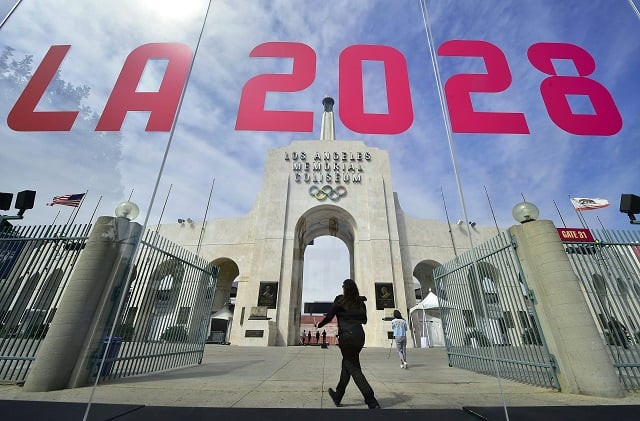Los Angeles Olympics to cost $6.9 billion
The Californian metropolis had initially been bidding against Paris for the 2024 Olympics

PHOTO: AFP
A statement from LA 2028 said the city's Olympic plan, which relies entirely on pre-existing venues and infrastructure, included a 10 percent contingency fund of $615.9 million.
The $6.9 billion price tag is higher than the previous figure of $5.3 billion quoted during the bid process in 2017, which was calculated in 2016 dollar values.
The higher figure cited on Tuesday takes into account likely inflation over the next decade.
LA 2028 said the budget had been independently evaluated by accounting giants KPMG and had been computed in "real dollars to offer a clear picture of financial health over time."
"Adjusted for inflation, LA 2028's real dollar budget is directly in line with the budget proposed for the 2024 Games bid," a statement said. The figure also factored in three percent, roughly $200 million, the bulk of which will be invested in local youth sports and four additional years of operation.
"Our budget is privately funded, realistic and fiscally conservative," said LA 2028 chairman Casey Wasserman.
"We are redefining what it means to host a successful Games and look forward to planning and hosting an amazing experience that will make our community proud."
Los Angeles was awarded the 2028 Olympics in 2017 after an unprecedented joint bid announcement by the International Olympic Committee in Lima.
The Californian metropolis, which will be hosting the Olympics for a third time, had initially been bidding against Paris for the 2024 Olympics.
With a shrinking pool of cities willing to shoulder the financial burden of staging the Olympics however, the IOC sought to reward both cities in order to lock in two bids seen as equally strong.
LA 2028 on Tuesday reiterated the fact that the games will require "no complex and costly construction projects or Games-related public infrastructure", areas which have been notorious for generating cost overruns in other Olympic cities.
Los Angeles' Olympic plan will see the city's prestigious UCLA campus used as the Olympic and Paralympic Village, while the University of Southern California will house the main press center and media village.
"Given that we are not building anything new in order to host the games, it makes our expenses a lot easier to estimate at this point in time," one senior bid official said. "We're confident in our ability to deliver on that expense plan."
A revamped Los Angeles Coliseum, venue for the 1932 and 1984 Olympics, will once again feature prominently in 2028, along with the Los Angeles Stadium, the futuristic multi-billion-dollar home of the Los Angeles Rams which will open for business in 2020.
"Nothing has changed," one bid official said. "Our mantra was to fit the games to the city, not fit the city to the games."
Revenues for the games include an $898 million contribution from the IOC as well as $637 million related to the IOC's sponsorship programmes.
More than $2.5 billion will be raised through domestic sponsorship in the United States along with a further $1.93 billion in ticket sales and hospitality.
The bullish LA 2028 forecasts come after French watchdogs warned last year that the Paris 2024 Olympics faced a possible $616 million overrun, forcing organizers to revise their spending to keep within a $7.6 billion budget.
Meanwhile, the 2020 Tokyo Olympics are projected to cost around $12.1 billion according to a December 2018 forecast.
The 2016 Rio de Janeiro Olympics meanwhile came with a hefty $13.2 billion price tag.



















COMMENTS
Comments are moderated and generally will be posted if they are on-topic and not abusive.
For more information, please see our Comments FAQ